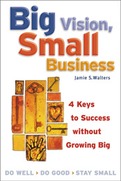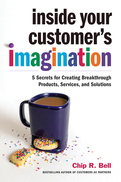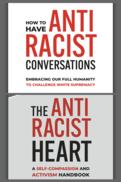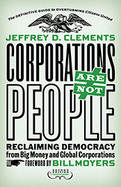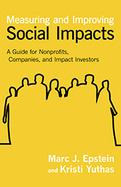This journal will help you claim permission to live your purpose. Based on the bestselling philosophies of radical self-love, emergent strategy, and pleasure activism, this journal gives you permission to love yourself deeply as you are.
Journaling to these prompts will help you surrender to your body's needs instead of forcing yourself into cramped disciplines. It will encourage you to become awed by the natural beauty of your divine self instead of being rampantly self-critical. It will aid you in embracing your shadows and accepting responsibility for your impact all while liberating you to just be.
This structured journal provides six key practices, with prompts for each practice that center on curiosity, surrender, grace, and satisfaction.
While most of the business world worships size and constant growth, Big Vision, Small Business celebrates the art-and power-of small. Based on over seventy interviews with small-business owners and on her own experiences as a successful small-business entrepreneur, Jamie Walters shows readers how a business can stay small and remain vital, healthy, and successful.
Theres a new category of business owner today whose bottom line combines making a profit and having a personal life with a commitment to socially conscious enterprise. Big Vision, Small Business takes an in-depth look at four key areas necessary to maintain this type of enterprise. Covering growth options, small-enterprise advantages, inspired visioning, communication and right-relationship, mindset issues and expectation management, and wisdom and mastery practices, Big Vision, Small Business is a must-read for every entrepreneur and futurist.
Organizations need to offer customers breakthrough products, services, and solutions to effectively compete in today's innovation-hungry economy. The challenge is customers often don't know precisely what they want. As Henry Ford is reputed to have said, “If I had asked people what they wanted, they would have said faster horses."
To surprise and awe your customers, Chip Bell advises developing co-creation partnerships with them. Co-creation partnerships are about fulfilling customers' hopes and aspirations, not just their needs and expectations. Co-creation partnerships require (1) curiosity that uncovers insight, (2) grounding that promotes clear focus, (3) discovery that fosters risk-taking, (4) trust that safeguards partnership purity, and (5) passion that inspires energized generosity.
Using examples from organizations like McDonald's, DHL, Marriott, Lockheed Martin, Discover Financial, Ultimate Software, and many more, Bell shows how co-creation partnerships enable you to tap into the treasure trove of ideas, ingenuity, and genius-in-the-raw within every customer.
Two antiracism books, one low price.
How to Have Antiracist Conversations: Embracing Our Full Humanity to Challenge White Supremacy
Utilizing Dr. Martin Luther King’s Beloved Community framework, activists will be empowered to create change and equity through fierce yet compassionate dialogue against racism and systematic white supremacy.
The Antiracist Heart: A Self-Compassion and Activism Handbook
The Antiracist Heart delivers a unique path to antiracist activism and introspection by applying neuroscience exercises, questionnaires, and journaling prompts based on the book How to Have Antiracist Conversations.
- A plain-English guide to the disastrous practical consequences of the bizarre legal doctrine of corporate personhood enshrined most recently in the Supreme Courts Citizens United decision
- Features a constitutional amendment designed to overturn Citizens United and restore the government to the people
- Includes a tool kit to help citizens mount a grassroots campaign to pass the Peoples Rights amendment
- Click here for the press release
The January 2010 Supreme Court Citizens United v. Federal Election Commission decisionmarked a culminating victory for the legal doctrine of corporate personhood. Corporations, as legal persons, are now entitled to exercise their alleged free-speech rights in the form of campaign spending, effectively enabling corporate domination of the electoral process.
Jeffrey Clements uncovers the roots, expansion, and far-reaching effects of the strange and destructive idea, which flies in the face of not only all common sense but, Clements shows, most of American legal history, from 1787 to the 1970s. He details its impact on the American political landscape, economy, job market, environment, and public healthand how it permeates our daily lives, from the quality of air we breathe to the types of jobs we can get to the politicians we elect. Most importantly, he offers a solution: a constitutional amendment to reverse Citizens United and tools readers can use to mount a grassroots drive to get it passed.
Overturning Citizens United is not about a triumph of one political ideology over anotherits about restoring the democratic principles on which America was built. Republican president Theodore Roosevelt and conservative Supreme Court Chief Justice William Rehnquist both vocally opposed the idea of corporate personhood. Community by community, state by state, we can cross party and ideological lines to form a united front against unchecked corporate power in Americaand reinstate a government that is truly of, by, and for the people.
- Cowritten by the author of Making Sustainability Work , a book that revolutionized best practices in sustainability and has been widely adopted in boardrooms and classrooms
- Offers a detailed, reliable, and proven approach to rigorously evaluating and increasing the social impact of philanthropic efforts
- Based on interviews with over sixty foundations, nonprofits, corporations, and investment firms and filled with real-life examples
The world is beset with enormous problems that desperately need solutions. And as a nonprofit, NGO, foundation, impact investor, or socially responsible company, your organization is on a mission to provide those solutions.
But what exactly should you do? And how will you know whether it's working? Too many people assume that good intentions will result in meaningful actions and leave it at that. But thanks to Marc Epstein and Kristi Yuthas, social impact can now be evaluated with the same kind of precision achieved for any other organizational function.
Based on years of research and analysis of field studies from around the globe, Epstein and Yuthas offer a five-step process that will help you gain clarity about the impacts that matter most to you and will provide you with methods to measure and improve those impacts. They offer a systematic approach to deciding what resources you should invest, what problem you should address, and which activities and organizations you should support. Once you've made those decisions, they provide tools, frameworks, and metrics for defining exactly what success looks like, even for goals like reducing global warming or poverty that are extremely difficult to measure. Then they show you how to use the data you've gathered to further develop and increase your social impact.
Epstein and Yuthas personally interviewed leaders at over sixty different organizations for this book and include examples from nearly a hundred more. This is unquestionably the most complete, practical, and thoroughly researched guide to taking a rigorous, data-driven approach to expanding the good you do in the world.



